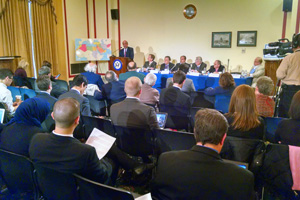On May 12, 2015, the National Council on U.S.-Arab Relations, the West Asia Council, and the U.S.-GCC Corporate Cooperation Committee are hosting a public affairs briefing titled “After a Nuclear Agreement: Whither Arab-Iranian and U.S.-GCC Relations?“ Featured specialists include:
- Dr. John Duke Anthony, Founding President and CEO, National Council on U.S.-Arab Relations; Member, U.S. Department of State Advisory Committee on International Economic Policy and Subcommittee on Sanctions; Author, “Strategic Dynamics of Iran-GCC Relations”;
- Dr. Christian Koch, Director, Gulf Research Center Foundation (Geneva, Switzerland); former Director of International Studies, Gulf Research Center (Dubai, UAE);
- Dr. Sara Vakhshouri, President, SVB Energy International; Author, The Marketing and Sale of Iranian Export Crude Oil Since the Islamic Revolution;
- Dr. Thomas Mattair, Executive Director, Middle East Policy Council; Author,The Three Occupied UAE Islands: The Tunbs and Abu Musa and Global Security Watch – Iran: A Reference Handbook;
- Dr. Alidad Mafinezam, President, West Asia Council; Author, Iran and Its Place Among Nations; and
- Dr. Imad Harb, Distinguished International Affairs Fellow, National Council on U.S.-Arab Relations; former Senior Researcher in Strategic Studies, Emirates Center for Strategic Studies and Research, Abu Dhabi, United Arab Emirates.
Mr. John Pratt, Member, Board of Directors, and Distinguished International Affairs Fellow, National Council on U.S.-Arab Relations, and former Chairman, Middle East Council of the American Chambers of Commerce, will serve as moderator.
DATE & TIME:
May 12, 2015
8:30 – 9:00 a.m. – Coffee & Tea / Networking
9:00 – 11:00 a.m. – Remarks / Q&A
LOCATION:
Rayburn House Office Building
Room B-369
45 Independence Ave SW
Washington, DC 20515
REGISTRATION:
The event is free but R.S.V.P. (acceptances only) online: http://conta.cc/1ce4j5x or via email to rsvp@ncusar.org is required.
Please note: seating capacity is limited. Include the following information when you R.S.V.P.:
Name:
Company:
Title:
Phone:
Email:
If you have any questions you can call the National Council on U.S.-Arab Relations at (202) 293-6466.


 On April 8, 2015, the National Council on U.S.-Arab Relations and the U.S.-GCC Corporate Cooperation Committee hosted a public affairs briefing on “Assessing the Iran Nuclear Deal: Issues and Implications” in the Rayburn House Office Building in Washington, DC.
On April 8, 2015, the National Council on U.S.-Arab Relations and the U.S.-GCC Corporate Cooperation Committee hosted a public affairs briefing on “Assessing the Iran Nuclear Deal: Issues and Implications” in the Rayburn House Office Building in Washington, DC.


You must be logged in to post a comment.